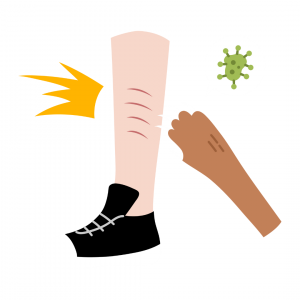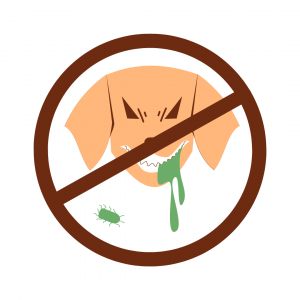Our clients are often surprised to hear about the risk of rabies during their travel consults. It’s something we rarely need to think about living in BC, so the idea of a dog, cat, or monkey bite being potentially fatal is something that often doesn’t cross a person’s mind.
The World Health Organization estimates that tens of thousands of deaths occur worldwide every year from rabies. It is a risk in more than 150 countries. Dogs are the main cause of rabies deaths in humans, however it is a vaccine-preventable disease. The pre-exposure vaccine series has traditionally consisted of 3 vaccines prior to travel. The cost and the time to complete the vaccines can be a barrier for those at risk to receive the vaccine. Fortunately, the pre-exposure vaccine series has been shortened to 2 doses before travel, making the vaccine more accessible to those who may not be able to afford it otherwise.
In this blog I’ll tell you more about this fatal disease, the risk for travelers, and whether you should consider receiving the vaccine before your next trip.
What is Rabies?
Rabies is caused by a virus that infects the central nervous system. It is spread to humans from the saliva of infected animals, usually through a bite or scratch. Up to 99% of cases of rabies in humans are caused by dogs. Bats are the next most common source of infection in humans.
Symptoms in humans usually begin within a few weeks to several months after exposure, but can also occur up to a year later. Once symptoms of rabies begin to show in humans it is 100% fatal. Symptoms can include:
 Fever
Fever- Unexplained tingling, pain, or burning at the wound site
- Anxiety
- Muscle weakness
- Paralysis
- Spasms of swallowing muscles
- Hydrophobia (fear of water)
- Confusion
- Seizures
- Coma
- Death
Which Animals Transmit Rabies?

 Only mammals carry rabies and any mammal can be potential carrier. However, the main carrier tends to be dogs in developing countries. Other wildlife that carries rabies include bats, cats, monkeys, foxes, jackals, mongooses, badgers, raccoons, skunks, coyotes, wolves, cattle, and horses.
Only mammals carry rabies and any mammal can be potential carrier. However, the main carrier tends to be dogs in developing countries. Other wildlife that carries rabies include bats, cats, monkeys, foxes, jackals, mongooses, badgers, raccoons, skunks, coyotes, wolves, cattle, and horses.
It’s not always obvious that an animal has rabies, but some animals might act strange. Some might be aggressive or drool more than normal. Bats might be active in the day. Some might act more shy or tame, move slowly, or let them get close to you. Other animals might appear totally normal.
Rabies in BC
Fortunately, if you’re bitten by a dog in BC you don’t have to worry about rabies. The only known carrier in BC is bats. According to the BC Centre for Disease Control only about 0.5% of bats in BC are carriers.
Where is the Risk for Travelers?
Rabies is a risk in more than 150 countries. There are around 10 million exposures every year worldwide. The rabies virus is present on all continents except for Antarctica. Rabid dogs can be found in Africa, Asia, and parts of Central and South America. About 95% of rabies deaths occur in Africa and Asia.
The US Center for Disease Control (CDC) estimates that the rate of rabies exposures in travelers ranges from 16 to 200 per 100,000 travelers. The majority of reported cases in international travelers over the last several years occurred in India, Philippines, Morocco, and Mexico. You can select the country you are travelling to from the US CDC’s drop-down list to determine if canine (dog) rabies is a risk in your destination and if the vaccines and treatment are available.
How to Avoid Rabies When Travelling
 The key message for travelers is to avoid being bitten by an animal. An animal bite can ruin your entire trip so it’s important to avoid animals:
The key message for travelers is to avoid being bitten by an animal. An animal bite can ruin your entire trip so it’s important to avoid animals:
- Don’t touch or feed any dogs, cats, or monkeys (those beach dogs in Thailand may look friendly and cute but there’s always a chance they could be carrying rabies).
- Don’t carry food on you or in your bag which could attract an animal to you.
- Teach children not to touch or play with any dogs, monkeys or cats, or wildlife.
- Don’t touch any bats, dead or alive. Wear protective gear before entering caves where bats can be found.
- Wear protective gear if you’re working with animals on your trip.
What to do if You’re Bitten or Scratched While Travelling
It’s very important to act quickly if you’re bitten or scratched by an animal on your trip:
- Wash the wound with an abundant amount of soap and water for 15 minutes. You can also use povidone iodine if it’s available.
- Seek medical attention right away to have the wound treated and to start the rabies post-exposure treatment.
- Be prepared to travel back to Canada or to another country if the rabies treatment is not available in your destination country. Travel medical evacuation insurance purchased prior to your trip is a must.
- If treated for rabies while travelling, take a photo of the products given to you and follow-up with your local Public Health Unit on return from your trip to continue with your treatment. Please note that TMVC only provides the pre-exposure vaccines before travel, and does not provide any post-exposure treatment.
How to Locate the Rabies Post-Exposure Treatment While Travelling
It can be difficult to navigate health care in a foreign country where you may not speak the language. If you need post-exposure rabies treatment there are a few things you can do to locate the proper treatment:
- Contact the emergency number provided by your travel medical insurance provider. The insurance company may be able to direct you to a health care facility where rabies treatment is available.
- Check the International Society of Travel Medicine’s (ISTM) Global Clinic Directory. You can select the country you are in from the drop-down menu and check off the box for “Post Exposure Rabies Vaccinations” under “Services Offered.” The clinic contact information will be displayed if there is a clinic registered with the ISTM in your destination country.
- Seek medical attention at a local hospital or health care facility. It’s a good idea to research local health care facilities in advance of your trip so you know where to go in the event you need medical care.
The Pre-Exposure Rabies Vaccine
In 2022, the 3-dose pre-exposure rabies vaccine series was replaced with a 2-dose series for protection up to 3 years. Two doses of the vaccine are given 7 days apart. Both doses must be completed before departure. Depending on your risk, a booster dose can be given between 21 days to 3 years after the primary series to provide long term protection.
*Important: rabies post-exposure treatment is necessary after a potential exposure to rabies, even if you have completed 2 or 3 doses of the pre-exposure vaccines. The treatment will be simplified and does not require Rabies Immune Globulin if you completed the pre-exposure vaccine series.
The rabies vaccine is safe and effective. Side effects can include soreness at the injection site, headache, fever, fatigue, or muscle aches. If any of these side effects occur, they are usually mild and last only a day or two.
Who Should Get the Rabies Vaccine?
 Some travelers may be at an increased risk of rabies exposure. The pre-exposure vaccine series may be recommended depending on your destination and the occurrence of rabies in that country, the availability of rabies post-exposure treatment, your planned activities, your duration of stay, and the plan for future travel to high-risk destinations. Activities that can increase the risk of exposure for travelers include those who:
Some travelers may be at an increased risk of rabies exposure. The pre-exposure vaccine series may be recommended depending on your destination and the occurrence of rabies in that country, the availability of rabies post-exposure treatment, your planned activities, your duration of stay, and the plan for future travel to high-risk destinations. Activities that can increase the risk of exposure for travelers include those who:
- Explore caves or are likely to have contact with bats.
- Interact with animals, such as vets, wildlife workers or volunteers, field biologists, or trappers.
- Plan to travel in remote areas where access to post-exposure treatment is limited.
The pre-exposure vaccine series can should also be considered for children spending a considerable amount of time in a country where dogs carry rabies. A child may be more curious to approach dogs and other animals. Their small stature puts them at risk of severe bites to the face and head, which increases the risk of developing rabies.
How to Book Your Pre-Exposure Rabies Vaccines
An experienced travel nurse consultant or physician can assess the rabies risk for your destination and planned activities. Be sure to book your appointment more than a week prior to your departure to allow time to complete the 2-dose vaccine series. To book your travel consult simply call us at 1-888-288-8682 or book online.

